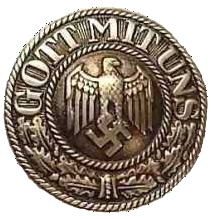the appeal sent out by the bourgeois democracy to fight Marxism with intellectual weapons was a piece of folly for which a terrible expiation had to be made later on. For Marxism always professed the doctrine that the use of arms was a matter which had to be judged from the standpoint of expediency and that success justified the use of arms.
This idea was proved correct during the days from November 7 to 10, 1918. The Marxists did not then bother themselves in the least about parliament or democracy, but they gave the death blow to both by turning loose their horde of criminals to shoot and raise hell.
When the Revolution was over the bourgeois parties changed the title of their firm and suddenly reappeared, the heroic leaders emerging from dark cellars or more lightsome storehouses where they had sought refuge. But, just as happens in the case of all representatives of antiquated institutions, they had not forgotten their errors or learned anything new. Their political programme was grounded in the past, even though they themselves had become reconciled to the new regime. Their aim was to secure a share in the new establishment, and so they continued the use of words as their sole weapon.
Therefore after the Revolution the bourgeois parties also capitulated to the street in a miserable fashion.
When the law for the Protection of the Republic was introduced the majority was not at first in favour of it. But, confronted with two hundred thousand Marxists demonstrating in the streets, the bourgeois 'statesmen' were so terror-stricken that they voted for the Law against their wills, for the edifying reason that otherwise they feared they might get their heads smashed by the enraged masses on leaving the Reichstag.
And so the new State developed along its own course, as if there had been no national opposition at all.
The only organizations which at that time had the strength and courage to face Marxism and its enraged masses were first of all the volunteer corps1 and subsequently the organizations for self-defence, the civic guards and finally the associations formed by the demobilized soldiers of the old Army.
But the existence of these bodies did not appreciably change the course of German history; and that for the following causes:
As the so-called national parties were without influence, because they had no force which could effectively demonstrate in the street, the Leagues of Defence could not exercise any influence because they had no political idea and especially because they had no definite political aim in view.
The success which Marxism once attained was due to perfect co-operation between political purposes and ruthless force. What deprived nationalist Germany of all practical hopes of shaping German development was the lack of a determined co-operation between brute force and political aims wisely chosen.
Whatever may have been the aspirations of the 'national' parties, they had no force whatsoever to fight for these aspirations, least of all in the streets.
The Defence Leagues had force at their disposal. They were masters of the street and of the State, but they lacked political ideas and aims on behalf of which their forces might have been or could have been employed in the interests of the German nation. The cunning Jew was able in both cases, by his astute powers of persuasion, in reinforcing an already existing tendency to make this unfortunate state of affairs permanent and at the same time to drive the roots of it still deeper.
The Jew succeeded brilliantly in using his Press for the purpose of spreading abroad the idea that the defence associations were of a 'non-political' character just as in politics he was always astute enough to praise the purely intellectual character of the struggle and demand that it must always be kept on that plane.
1 After the débâcle of 1918 several semi-military associations were formed by demobilized officers who had fought at the Front. These were semi-clandestine associations and were known as Freikorps (Volunteer corps). Their principal purpose was to act as rallying centres for the old nationalist elements.














